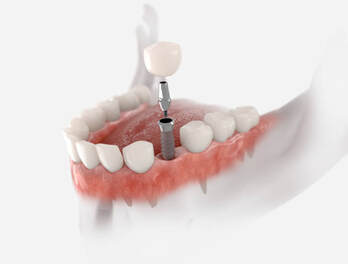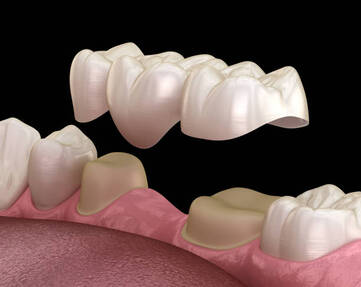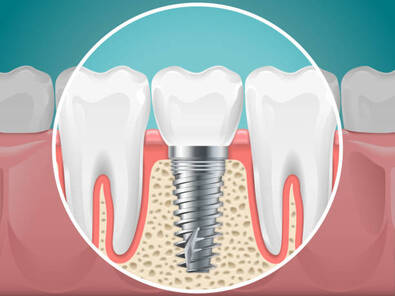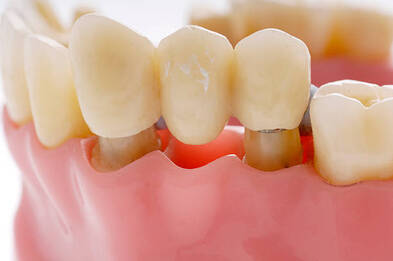When it comes to replacing a missing tooth, dental implants and dental bridges are two popular options. Popular because both options are fixed in our mouth and don't come "in and out." Both treatments offer their unique set of benefits and drawbacks. Understanding the pros and cons of dental implants and dental bridges can help you make an informed decision that suits your oral health needs and preferences. Let's delve into the key aspects of each treatment to help you choose the best option for you.
Dental Implants
Dental implants are considered a modern and highly successful tooth replacement solution.
- Durability and Longevity: Dental implants are designed to be a long lasting solution. Made of biocompatible materials such as titanium, they fuse with the jawbone, creating a strong and stable foundation. With proper care, implants can last a lifetime.
- Natural Appearance and Functionality: Implants closely resemble natural teeth in terms of appearance, feel, and functionality. They provide excellent chewing ability and restore your smile with a natural-looking prosthetic tooth.
- Bone Preservation: Implants stimulate the jawbone, preventing bone loss that often occurs with tooth loss. By maintaining the bone structure, implants contribute to overall oral health and facial aesthetics.
- Simple Cleaning: Implants can be cared for just like natural teeth. Regular brushing, flossing, and dental check-ups are sufficient to keep them clean and healthy.
Cons:
- Invasive Procedure: The process of getting dental implants involves oral surgery and a healing period before the prosthetic tooth can be placed. This surgical aspect may not be suitable for individuals with certain health conditions.
- Time Commitment: Implant treatment typically requires multiple visits over several months. This timeframe accounts for the implant integration with the jawbone and ensures a successful outcome.
Dental Bridges:
Dental bridges have been a traditional and reliable option for replacing missing teeth. Here are the pros and cons of dental bridges:
- Time: Dental bridges can often be placed in a relatively short period. Once the supporting teeth are prepared, the bridge can be installed, giving you an immediate replacement for the missing tooth.
- Less-Invasive: Unlike implants, bridges do not typically require surgery or bone integration. Bridges rely on adjacent teeth for support, which can be advantageous for individuals who are not candidates for surgical procedures.
Cons:
- Increased Risk to Adjacent Teeth: Dental bridges involve the preparation of the adjacent healthy teeth to support the bridge. This process may weaken those teeth and increase the risk of decay or other dental problems in the future.
- Bone Loss: Unlike dental implants, bridges do not stimulate the jawbone, which can lead to bone loss over time. This can affect the facial structure and may require additional procedures down the line.
- More Difficult Maintenance: Cleaning under a dental bridge is more complex than a dental implant, as you need to pass floss under the bridge to clean debris and floss the adjacent teeth.
Let's look at what the clinical studies have to say about implant and dental bridge longevity.
Lifespan of Dental Implants:
- According to a systematic review published in the Journal of Dentistry in 2017, dental implants have a high success rate, with a 10-year survival rate of 92-97% and a 15-year survival rate of 90-95%.
- A study published in Clinical Oral Implants Research in 2018 analyzed 2,670 dental implants placed over a 10-year period. The study found a cumulative survival rate of 97.3% after 10 years.
- Research published in the Journal of Periodontology in 2019 reviewed long-term outcomes of dental implants and reported a 15-year survival rate ranging from 84.5% to 97.7%
- A study published in the Journal of Dental Research in 2013 evaluated the survival rates of dental bridges. The research found that after 10 years, the average survival rate of bridges was 95.4%.
- Another study published in the International Journal of Prosthodontics in 2016 examined the longevity of dental bridges. The results indicated that the average lifespan of bridges ranged from 8 to 12 years, with a 10-year survival rate of 90-95%.
Interested in finding out more about replacing your missing teeth? Call McAdams Dental today to schedule a consultation to find out if a dental implant or bridge is the right option for you! (480) 991-4727.
More info on Dental Implants and Dental Bridges
ADA - https://www.mouthhealthy.org/all-topics-a-z/implants
PudMed - https://pubmed.ncbi.nlm.nih.gov/26252025/
FDA - https://www.fda.gov/medical-devices/dental-devices/dental-implants-what-you-should-know
Mayo Clinic - https://www.mayoclinic.org/tests-procedures/dental-implant-surgery/about/pac-20384622




 RSS Feed
RSS Feed